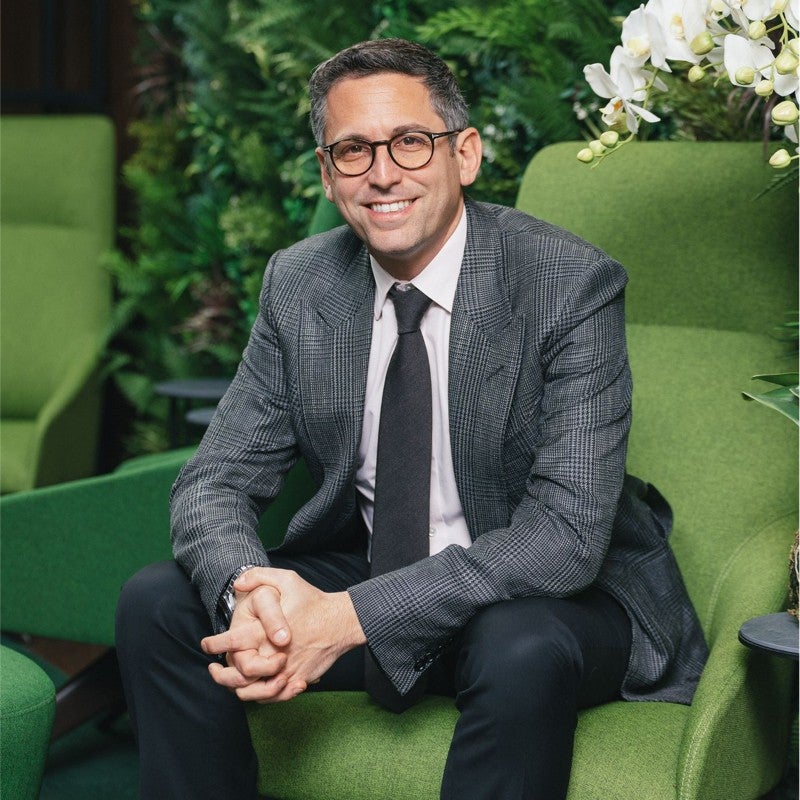
DUBAI – One of the key achievements of COP28 has been a pledge to triple renewables and double the rate of energy efficiency by 2030. It has so far been signed by 123 countries – including the EU and US (though not India and China) – and its inclusion in the final cover text of COP28 is a key policy push for climate-ambitious nations.
Most of the press has been focused on the ‘triple renewables’ aspect of the pledge: “Leaders pledge to triple renewable generation capacity by 2030,” said S&P Global; “Countries promise clean energy boost at COP28 to push out fossil fuels,” said Reuters.
Energy efficiency – long an area accused of being ‘overlooked’ by policymakers – lacked much of the spotlight after the pledge was announced. But for at least one man at COP28 in Expo City Dubai, the energy efficiency element was nothing short of momentous.
“This is an extraordinary moment. There has never been anything like the focus going into energy efficiency as there is at this moment”, said Jonathan Maxwell, CEO and founding partner of Sustainable Development Capital (SDCL), an investment banking firm for energy efficiency project finance, in an interview with Energy Monitor.
“Energy efficiency is genuinely the largest, fastest and cheapest source of greenhouse gas emissions reductions,” says Maxwell. “If that’s what this whole process at COP is about, then this is certainly the most important thing that can be achieved at these discussions.”
SDCL was established in 2007 and now manages more than $2bn of assets across over 50 investments in the UK, Europe, North America and Asia. Maxwell founded the company after previously working at HSBC Infrastructure, where he witnessed how in China environmental degradation as a result of rapid development was beginning to have a real, measurable effect on GDP.

US Tariffs are shifting - will you react or anticipate?
Don’t let policy changes catch you off guard. Stay proactive with real-time data and expert analysis.
By GlobalData“I decided what I wanted to do was set up a dedicated financial institution to focus on environmental infrastructure,” Maxwell told Energy Monitor. Energy efficiency became the focus of SDCL because it is a “critical piece of the decarbonisation puzzle”, he says.
A report published just ahead of COP28 by the International Energy Agency calculates that – should the world realise its pledge of doubling the rate of energy efficiency until 2030 – energy efficiency will be responsible for as much as 50% of all the CO2 emissions reductions achieved by 2030.
Energy efficiency has achieved major prominence in policy circles over the past two years as a result of the global energy crisis, says Maxwell, and particularly due to the EU’s policy drive to reduce its reliance on Russian gas as quickly as possible. New energy security concerns resulting from extreme weather events in the US – such as Superstorm Sandy and Hurricane Ida – have also contributed to energy efficiency’s greater profile, he adds.
“The energy crisis has unambiguously accelerated the energy transition, with energy efficiency policy action a central plank of government initiatives,” concur the authors of the IEA report. “Energy efficiency is currently seeing a strong global focus among policy makers in recognition of its important role in enhancing energy security and affordability.”
Keep up with Energy Monitor: Subscribe to our weekly newsletterThe report highlights how territories including the EU, US, Türkiye and UK have already recorded “exceptional” energy efficiency gains of more than 4% over the past year. If the world doubles its current annual energy efficiency improvement of 2% each year until 2030, the authors add, we can expect 7GtCO2 emissions savings in 2030, energy bills in advanced economies lowered by a third, and 4.5 million more jobs than today.
Maxwell believes there has also been significant corporate interest driving energy efficiency.
“Many of the world’s largest companies have now ... committed themselves to incredibly aggressive targets,” he says. “Energy efficiency is an effective way to cut costs and improve energy security and resilience.”
Unlike other agendas being pushed at COP28 – such as climate adaptation or loss and damage – investment programmes for energy efficiency are not difficult to define.
“Energy efficiency is tried and tested: you invest and you save money,” says Maxwell. He gives two practical examples: the first is the fact that in 2012 just 2% of lighting was LED; now that figure is 60%, as a result of a global policy drive. The second is an example of SDCL’s own work. It was commissioned by Santader bank in the UK to replace 90,000 lights across more than 800 buildings in the bank’s estate. The ultimate cost of the project was less than it would have been had the bank not invested in new lighting.
“The project was a win both for us and for Santander. It’s very rare that you get that in business,” says Maxwell.
More than 90% of SDCL’s investment goes into project financing in the energy efficiency sector. To provide ‘a competitive edge’, it also invests in pioneering companies in the energy efficiency space, including in new forms of heat battery and liquid storage, among other things.
“What we do is different from mainstream infrastructure investment, because we have to have a level of in-house expertise," Maxwell says. “There are other service companies and divisions of utilities that do what we do, but there are very few integrated developer-investors like us in this space.”
COP28's action on energy efficiency makes Maxwell much more optimistic about the world’s ability to meet its climate targets.
“I'm now very optimistic because I wake up every morning in a world that wastes 75% of its energy, half of its food and a third of its water,” he says. “If I woke up every morning and the whole thing was efficient, just humming along, then the whole challenge of decarbonisation would be so much easier.
“Policymakers are beginning to realise that, which is massively exciting.”



